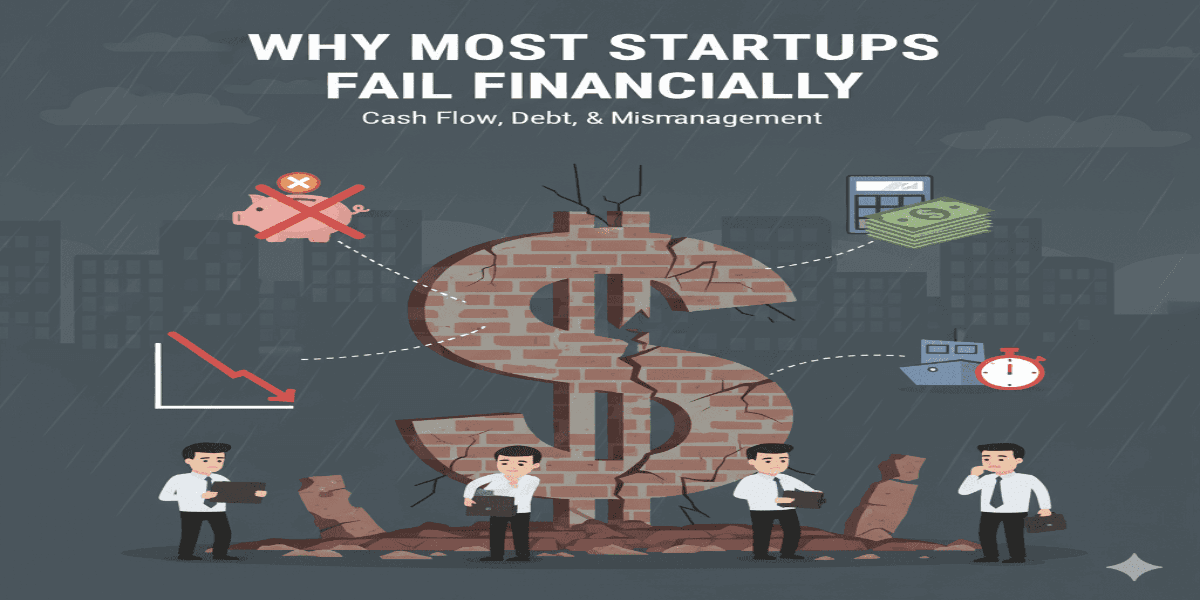Why Most Startups Fail Financially?
Why Most Startups Fail Financially?
The dream of building a successful startup has inspired millions of entrepreneurs across the globe. Yet behind the stories of unicorn companies and billion-dollar acquisitions lies a much harsher reality: most startups fail — and finances are usually the number one cause.
According to multiple studies, nearly 90% of startups eventually shut down, and around 38% cite running out of money or failing to secure new capital as the primary reason. Even brilliant ideas, cutting-edge technologies, or passionate founders can’t survive when financial fundamentals are ignored.
HSBC Cashback Credit Card 2025 – Benefits, Rewards & How to Apply?

The Cruelty of Startup Life
It has never been simpler to launch a business, but it has never been more difficult to keep it going. Thanks to technology, crowdsourcing, and remote collaboration tools, entrance hurdles have decreased. However, those same benefits also feed fierce rivalry, narrow profit margins, and elevated investor expectations.
Although innovation and disruption are key components of the startup ecosystem, founders frequently prioritize financial sustainability last. Money is quickly spent on passion projects. Stable revenue streams are overshadowed by growth-at-all-costs tactics. Ultimately, a lot of founders learn too late that they have created a product rather than a company.
Typical Financial Causes of Startup Failure
Ineffective Cash Flow Management
The lifeblood of any firm is cash flow. Startups frequently fail because they don’t have enough liquid capital to fund their ongoing expenses. On paper, a business may appear lucrative, yet it may still be unable to pay its rent, employees, or suppliers.
Lesson: It’s critical to estimate cash flow and keep at least six to twelve months of runway.
Insufficient Financial Planning
The financial aspect of managing a firm is often overlooked by founders. They might be highly skilled in coding, marketing, or product design, but financial literacy is frequently overlooked.
- No budgeting that is reasonable.
- Overestimating the possibilities for revenue.
- Underestimating costs associated with customer acquisition, taxes, and legal fees.
A thorough financial strategy serves as a road map for survival. Startups are operating in the dark without it.
An excessive reliance on outside funding
Angel and venture capital investments can spur quick expansion, but they can also lead to risky dependence. When investor support for startups that only use outside capital wanes, they frequently fail.
- Funding rounds frequently postpone failure rather than stop it.
- Returns are what investors look for; if growth slows, money evaporates.
Raising money alone is not enough for a sustainable startup strategy; revenue generation is also necessary.
Unregulated Rate of Burning
The speed at which a company spends funds is referred to as its “burn rate.” All too frequently, businesses scale too soon by making costly office openings, hiring a lot of people, or spending money on marketing campaigns before they have steady revenue.
Startups are sustained by discipline rather than extravagant expenditure.
Ignoring Market Reality
Financial failure is often the symptom of a deeper issue: no real market demand. A startup can spend millions building a product that nobody truly needs.
- If customers don’t pay, the startup doesn’t survive.
- Even innovative products fail without a monetization strategy.
Startups must validate demand early through surveys, prototypes, and paying pilot users.
Pricing Mistakes
Pricing can make or break a business. Some startups underprice their services in a bid to attract customers, only to discover they cannot cover costs. Others overprice without proving value, scaring away their market.
- Low pricing = high volume but unsustainable losses.
- High pricing = limited adoption and low market share.
A smart pricing model aligns with both customer expectations and operational costs.
Poor Debt Management
Many startups heavily rely on loans or credit lines to stay afloat. In the absence of organized repayment strategies, debt becomes unmanageable.
- Long-term liabilities might result from short-term survival strategies.
- Future finance prospects are limited by low credit ratings.
Startups need to understand the difference between “bad debt,” which covers continuous losses, and “good debt,” which is growth investment.
Expansion Without Baseline
Because they scale too quickly, many startups experience financial failure. Collapse is frequently the result of aggressive employment practices, market expansion, or the introduction of several product lines before the initial one is stabilized.
For instance, cash reserves may be depleted by entering foreign markets without fully comprehending the rules, cultural norms, and logistics.
Steady, controlled growth is preferable to rash expansion.
Investors’ Contribution to Financial Failures
Investors foster innovation, but it is impossible to overlook their part in financial failures. Many firms focus on appeasing investors rather than resolving consumer issues. Unrealistic growth targets are frequently followed by careless spending.
- The pursuit of “growth at all costs” by investors distorts fundamentals while inflating valuations.
- Startups are under pressure to grow before turning a profit.
- Even firms that appear to be successful can fail if investors suddenly lose faith in them.
Financial Collapse-Related Psychological Traps
Financial mismanagement is greatly influenced by psychology in addition to statistics.
- Optimism Bias: Without evidence to support their belief, founders assume that everything will “work out eventually.”
- Ego-Driven Decisions: Many entrepreneurs resist financial advice, assuming passion will overcome challenges.
- Fear of Failure: Some people keep investing in unprofitable models rather than reducing losses.
Startups fail financially for a variety of reasons, including the founders’ failure to face reality at an early age.
External Factors Impacting Startup Finances
Not all failures are internal. External factors often accelerate financial collapse:
- Economic downturns (like recessions or pandemics).
- Regulatory changes that increase compliance costs.
- Competition from better-funded rivals.
- Shifting consumer trends that reduce demand.
Lessons From Famous Startup Failures
History is filled with examples of startups that raised millions yet failed financially:
- Quibi: The short-form streaming service raised $1.75 billion but shut down in less than a year due to high burn rate and lack of user demand.
- Theranos: Once valued at $9 billion, the health startup collapsed due to unsustainable business practices and loss of investor trust.
- Pets.com: A dot-com bubble casualty that underestimated logistics costs and burned through funding.
How New Businesses Can Prevent Financial Failure
Gain a Solid Understanding of Finance
Basic knowledge of planning, cash flow management, and accounting should be possessed by any founder.
Create a Long-Term Revenue Model
Product strategy must include monetization; it cannot be an afterthought.
Continue to Run Your Business Lean
Iterate quickly, start small, and steer clear of wasteful spending.
Spread Out Your Sources of Funding
Rely on customer revenue, not just investors, to stay afloat.
Examine Your Financial Health Frequently
Monthly audits, forecasts, and scenario planning prevent surprises.
Hire Financial Experts
Even if founders lack financial knowledge, hiring a CFO or advisor is critical.
Plan for Worst-Case Scenarios
Recessions, customer churn, or supply chain issues should always be factored into survival strategies.
Concluding Remarks
Bold ideas and innovative technology are frequently glamorized by the appeal of startup culture, but the harsh reality is that most firms fail financially as a result of poor management, impractical development strategies, or a lack of financial preparation.
The lesson for would-be business owners is straightforward: love solving financial difficulties just as much as you love solving customer problems. A risky endeavor can become a long-lasting success story by appreciating money, developing resilience, and understanding mathematics.
Although it happens frequently, starting failure is not inevitable. You may become the next big startup success story with meticulous preparation, astute execution, and an unwavering focus on sustainable business principles.
Should You Always Pay Off Student Loans Early? Pros, Cons, and Expert Insights
Should You Always Pay Off Student Loans Early? Pros, Cons, and Expert Insights
